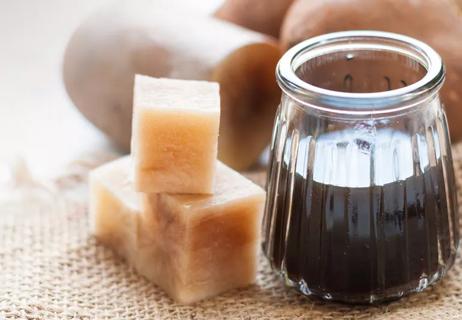High fructose corn syrup is a common sweetener in packaged foods and can contribute to weight gain and inflammation

Anyone who’s spent any amount of time reading nutrition labels has come across the words “high fructose corn syrup.” Look in your pantry right now and you’ll probably find it high up in the ingredients list on everything from soda and ketchup to bread and cereal.
Advertisement
Cleveland Clinic is a non-profit academic medical center. Advertising on our site helps support our mission. We do not endorse non-Cleveland Clinic products or services. Policy
But what exactly is high fructose corn syrup? And how does it affect your health? Registered dietitian Kate Patton, RD, LD, shares the not-so-sweet news about this ubiquitous sweetener.
High fructose corn syrup is a kind of processed sugar that’s used in a slew of packaged and prepared foods to satisfy your sweet tooth. It’s sweeter, cheaper and more shelf-stable than regular sugar — making it a boon for food manufacturers.
“High fructose corn syrup is made from cornstarch,” Patton shares. “But then, it goes through chemical processing that converts some of the glucose into fructose. And from there it becomes a liquid that’s added to all kinds of packaged foods.”
By the time it finishes processing, high fructose corn syrup is a combination of both glucose and fructose.
You’re most likely to find high fructose corn syrup in processed and packaged drinks and sweets, like:
And it can show up in some surprising places, too. That includes things you don’t necessarily think of as sweet-tasting, like some breads, pastas, canned soup and fast-food items.
There are a few reasons why high fructose corn syrup isn’t recommended as part of a healthy diet. Sugar and other sweeteners, including high fructose corn syrup, don’t benefit your body in any way. It’s all risk with no reward, physiologically speaking.
Advertisement
Patton shares some of the dangers.
Consuming high fructose corn syrup spurs a reaction that encourages your liver to create more fat.
When fat builds up, it can’t be passed through your body, so it hangs around.
“Our body can only absorb and use a certain amount of fat. So, the rest of it gets stored as triglycerides (a form of fat in your blood) or as body fat,” Patton explains.
That can trigger unintended weight gain and a cascade of health problems. High triglycerides and obesity are associated with a host of chronic health conditions, like:
Some researchers have found that a diet high in sugar, including high fructose corn syrup, may lead to increased inflammation in your body.
Inflammation is your body’s way of responding to things like injuries and infections. That’s normal. But chronic inflammation happens when your immune system doesn’t help your body. In fact, it gets in the way of your body working properly. And it can lead to troubles like:
“Eating high amounts of high fructose corn syrup can put stress on your GI tract. And that can raise markers for inflammation in your blood,” Patton notes.
Foods that use high fructose corn syrup tend to be highly processed. So, when you’re eating high fructose corn syrup, you’re also likely to be getting a mouthful of preservatives, food dyes, saturated fats and other stuff your body doesn’t need.
That leaves less room in your belly for the whole, natural foods that fuel your systems with vitamins, minerals, fiber, protein and other good-for-you nutrients.
If you’re looking to cut back on high fructose corn syrup (or cut it out completely), it’s time to start reading nutrition labels closely. You’ll see it listed as an ingredient list. And it’s counted on the “total sugars” line of the label.
The more you pay attention, the more you’ll see that high fructose corn syrup (as well as regular sugar and sugar alternatives) are probably more abundant in your diet than you realized. (Keep in mind that the American Heart Association recommends no more than 36 grams of sugar per day for men and 25 grams for women.)
Better yet, work to follow a diet that relies less on packaged foods at all.
“Whole foods, like fruits, can help you get the sweetness you’re looking for, without the trouble that comes with added sugars, including high fructose corn syrup,” Patton points out. “And you’ll get the fiber, vitamins and minerals that you need.”
Advertisement
And for those occasions where nothing will do the trick quite like a sugary treat, Patton recommends sticking with more natural sugars.
“If you’re going to go with something with added sugar, then a bit of sucrose (table sugar), honey or maple syrup can be better alternatives,” she suggests.
Advertisement
Learn more about our editorial process.
Advertisement

Erythritol is found in a range of ‘diet,’ ‘sugar-free’ and ‘keto-friendly’ foods — but research has linked it to heart attack and stroke

Although allulose is an FDA-approved sugar substitute, more research is needed to understand its safety

Studies and the FDA say this herbaceous alternative is safe in moderation, so go ahead and sprinkle away!

Xylitol in processed food can increase risk of heart attack and stroke — but there’s no danger in xylitol in oral care products

All-natural, plant-based and low-calorie, but it can also cause some serious digestive discomfort

Fruit is the best option for a healthy sweetener, but limit refined sugar and artificial sweeteners

Artificial sweeteners may have fewer calories, but they come with plenty of health concerns

Wearing a scarf, adjusting your outdoor activities and following your asthma treatment plan can help limit breathing problems

Your diet in the weeks, days and hours ahead of your race can power you to the finish line

When someone guilt trips you, they’re using emotionally manipulative behavior to try to get you to act a certain way